- Home
- G. K. Chesterton
The Innocence of Father Brown Page 7
The Innocence of Father Brown Read online
Page 7
The Wrong Shape
Certain of the great roads going north out of London continue far intothe country a sort of attenuated and interrupted spectre of a street,with great gaps in the building, but preserving the line. Here will be agroup of shops, followed by a fenced field or paddock, and then a famouspublic-house, and then perhaps a market garden or a nursery garden, andthen one large private house, and then another field and another inn,and so on. If anyone walks along one of these roads he will pass a housewhich will probably catch his eye, though he may not be able to explainits attraction. It is a long, low house, running parallel with the road,painted mostly white and pale green, with a veranda and sun-blinds, andporches capped with those quaint sort of cupolas like wooden umbrellasthat one sees in some old-fashioned houses. In fact, it is anold-fashioned house, very English and very suburban in the good oldwealthy Clapham sense. And yet the house has a look of having been builtchiefly for the hot weather. Looking at its white paint and sun-blindsone thinks vaguely of pugarees and even of palm trees. I cannot tracethe feeling to its root; perhaps the place was built by an Anglo-Indian.
Anyone passing this house, I say, would be namelessly fascinated by it;would feel that it was a place about which some story was to be told.And he would have been right, as you shall shortly hear. For this is thestory--the story of the strange things that did really happen in it inthe Whitsuntide of the year 18--:
Anyone passing the house on the Thursday before Whit-Sunday at abouthalf-past four p.m. would have seen the front door open, and FatherBrown, of the small church of St. Mungo, come out smoking a large pipein company with a very tall French friend of his called Flambeau, whowas smoking a very small cigarette. These persons may or may not be ofinterest to the reader, but the truth is that they were not the onlyinteresting things that were displayed when the front door of thewhite-and-green house was opened. There are further peculiarities aboutthis house, which must be described to start with, not only that thereader may understand this tragic tale, but also that he may realisewhat it was that the opening of the door revealed.
The whole house was built upon the plan of a T, but a T with a very longcross piece and a very short tail piece. The long cross piece was thefrontage that ran along in face of the street, with the front doorin the middle; it was two stories high, and contained nearly allthe important rooms. The short tail piece, which ran out at the backimmediately opposite the front door, was one story high, and consistedonly of two long rooms, the one leading into the other. The first ofthese two rooms was the study in which the celebrated Mr. Quinton wrotehis wild Oriental poems and romances. The farther room was a glassconservatory full of tropical blossoms of quite unique and almostmonstrous beauty, and on such afternoons as these glowing with gorgeoussunlight. Thus when the hall door was open, many a passer-by literallystopped to stare and gasp; for he looked down a perspective of richapartments to something really like a transformation scene in a fairyplay: purple clouds and golden suns and crimson stars that were at oncescorchingly vivid and yet transparent and far away.
Leonard Quinton, the poet, had himself most carefully arranged thiseffect; and it is doubtful whether he so perfectly expressed hispersonality in any of his poems. For he was a man who drank and bathedin colours, who indulged his lust for colour somewhat to the neglectof form--even of good form. This it was that had turned his geniusso wholly to eastern art and imagery; to those bewildering carpetsor blinding embroideries in which all the colours seem fallen into afortunate chaos, having nothing to typify or to teach. He had attempted,not perhaps with complete artistic success, but with acknowledgedimagination and invention, to compose epics and love stories reflectingthe riot of violent and even cruel colour; tales of tropical heavensof burning gold or blood-red copper; of eastern heroes who rode withtwelve-turbaned mitres upon elephants painted purple or peacock green;of gigantic jewels that a hundred negroes could not carry, but whichburned with ancient and strange-hued fires.
In short (to put the matter from the more common point of view), hedealt much in eastern heavens, rather worse than most western hells; ineastern monarchs, whom we might possibly call maniacs; and in easternjewels which a Bond Street jeweller (if the hundred staggering negroesbrought them into his shop) might possibly not regard as genuine.Quinton was a genius, if a morbid one; and even his morbidity appearedmore in his life than in his work. In temperament he was weak andwaspish, and his health had suffered heavily from oriental experimentswith opium. His wife--a handsome, hard-working, and, indeed, over-workedwoman objected to the opium, but objected much more to a live Indianhermit in white and yellow robes, whom her husband insisted onentertaining for months together, a Virgil to guide his spirit throughthe heavens and the hells of the east.
It was out of this artistic household that Father Brown and his friendstepped on to the door-step; and to judge from their faces, they steppedout of it with much relief. Flambeau had known Quinton in wild studentdays in Paris, and they had renewed the acquaintance for a week-end; butapart from Flambeau's more responsible developments of late, he did notget on well with the poet now. Choking oneself with opium and writinglittle erotic verses on vellum was not his notion of how a gentlemanshould go to the devil. As the two paused on the door-step, beforetaking a turn in the garden, the front garden gate was thrown open withviolence, and a young man with a billycock hat on the back of his headtumbled up the steps in his eagerness. He was a dissipated-looking youthwith a gorgeous red necktie all awry, as if he had slept in it, and hekept fidgeting and lashing about with one of those little jointed canes.
"I say," he said breathlessly, "I want to see old Quinton. I must seehim. Has he gone?"
"Mr. Quinton is in, I believe," said Father Brown, cleaning his pipe,"but I do not know if you can see him. The doctor is with him atpresent."
The young man, who seemed not to be perfectly sober, stumbled into thehall; and at the same moment the doctor came out of Quinton's study,shutting the door and beginning to put on his gloves.
"See Mr. Quinton?" said the doctor coolly. "No, I'm afraid you can't. Infact, you mustn't on any account. Nobody must see him; I've just givenhim his sleeping draught."
"No, but look here, old chap," said the youth in the red tie, tryingaffectionately to capture the doctor by the lapels of his coat. "Lookhere. I'm simply sewn up, I tell you. I--"
"It's no good, Mr. Atkinson," said the doctor, forcing him to fall back;"when you can alter the effects of a drug I'll alter my decision," and,settling on his hat, he stepped out into the sunlight with the othertwo. He was a bull-necked, good-tempered little man with a smallmoustache, inexpressibly ordinary, yet giving an impression of capacity.
The young man in the billycock, who did not seem to be gifted with anytact in dealing with people beyond the general idea of clutching hold oftheir coats, stood outside the door, as dazed as if he had been thrownout bodily, and silently watched the other three walk away togetherthrough the garden.
"That was a sound, spanking lie I told just now," remarked the medicalman, laughing. "In point of fact, poor Quinton doesn't have his sleepingdraught for nearly half an hour. But I'm not going to have him botheredwith that little beast, who only wants to borrow money that he wouldn'tpay back if he could. He's a dirty little scamp, though he is Mrs.Quinton's brother, and she's as fine a woman as ever walked."
"Yes," said Father Brown. "She's a good woman."
"So I propose to hang about the garden till the creature has clearedoff," went on the doctor, "and then I'll go in to Quinton with themedicine. Atkinson can't get in, because I locked the door."
"In that case, Dr. Harris," said Flambeau, "we might as well walk roundat the back by the end of the conservatory. There's no entrance to itthat way, but it's worth seeing, even from the outside."
"Yes, and I might get a squint at my patient," laughed the doctor, "forhe prefers to lie on an ottoman right at the end of the conservatoryamid all those blood-red poinsettias; it would give me the creeps. Butwhat are you doing?"
&n
bsp; Father Brown had stopped for a moment, and picked up out of the longgrass, where it had almost been wholly hidden, a queer, crooked Orientalknife, inlaid exquisitely in coloured stones and metals.
"What is this?" asked Father Brown, regarding it with some disfavour.
"Oh, Quinton's, I suppose," said Dr. Harris carelessly; "he has allsorts of Chinese knickknacks about the place. Or perhaps it belongs tothat mild Hindoo of his whom he keeps on a string."
"What Hindoo?" asked Father Brown, still staring at the dagger in hishand.
"Oh, some Indian conjuror," said the doctor lightly; "a fraud, ofcourse."
"You don't believe in magic?" asked Father Brown, without looking up.
"O crickey! magic!" said the doctor.
"It's very beautiful," said the priest in a low, dreaming voice; "thecolours are very beautiful. But it's the wrong shape."
"What for?" asked Flambeau, staring.
"For anything. It's the wrong shape in the abstract. Don't you ever feelthat about Eastern art? The colours are intoxicatingly lovely; but theshapes are mean and bad--deliberately mean and bad. I have seen wickedthings in a Turkey carpet."
"Mon Dieu!" cried Flambeau, laughing.
"They are letters and symbols in a language I don't know; but I knowthey stand for evil words," went on the priest, his voice growing lowerand lower. "The lines go wrong on purpose--like serpents doubling toescape."
"What the devil are you talking about?" said the doctor with a loudlaugh.
Flambeau spoke quietly to him in answer. "The Father sometimes gets thismystic's cloud on him," he said; "but I give you fair warning that Ihave never known him to have it except when there was some evil quitenear."
"Oh, rats!" said the scientist.
"Why, look at it," cried Father Brown, holding out the crooked knife atarm's length, as if it were some glittering snake. "Don't you see it isthe wrong shape? Don't you see that it has no hearty and plain purpose?It does not point like a spear. It does not sweep like a scythe. It doesnot look like a weapon. It looks like an instrument of torture."
"Well, as you don't seem to like it," said the jolly Harris, "it hadbetter be taken back to its owner. Haven't we come to the end of thisconfounded conservatory yet? This house is the wrong shape, if youlike."
"You don't understand," said Father Brown, shaking his head. "The shapeof this house is quaint--it is even laughable. But there is nothingwrong about it."
As they spoke they came round the curve of glass that ended theconservatory, an uninterrupted curve, for there was neither door norwindow by which to enter at that end. The glass, however, was clear, andthe sun still bright, though beginning to set; and they could see notonly the flamboyant blossoms inside, but the frail figure of the poetin a brown velvet coat lying languidly on the sofa, having, apparently,fallen half asleep over a book. He was a pale, slight man, with loose,chestnut hair and a fringe of beard that was the paradox of his face,for the beard made him look less manly. These traits were well knownto all three of them; but even had it not been so, it may be doubtedwhether they would have looked at Quinton just then. Their eyes wereriveted on another object.
Exactly in their path, immediately outside the round end of the glassbuilding, was standing a tall man, whose drapery fell to his feet infaultless white, and whose bare, brown skull, face, and neck gleamed inthe setting sun like splendid bronze. He was looking through the glassat the sleeper, and he was more motionless than a mountain.
"Who is that?" cried Father Brown, stepping back with a hissing intakeof his breath.
"Oh, it is only that Hindoo humbug," growled Harris; "but I don't knowwhat the deuce he's doing here."
"It looks like hypnotism," said Flambeau, biting his black moustache.
"Why are you unmedical fellows always talking bosh about hypnotism?"cried the doctor. "It looks a deal more like burglary."
"Well, we will speak to it, at any rate," said Flambeau, who was alwaysfor action. One long stride took him to the place where the Indianstood. Bowing from his great height, which overtopped even theOriental's, he said with placid impudence:
"Good evening, sir. Do you want anything?"
Quite slowly, like a great ship turning into a harbour, the great yellowface turned, and looked at last over its white shoulder. They werestartled to see that its yellow eyelids were quite sealed, as in sleep."Thank you," said the face in excellent English. "I want nothing." Then,half opening the lids, so as to show a slit of opalescent eyeball,he repeated, "I want nothing." Then he opened his eyes wide with astartling stare, said, "I want nothing," and went rustling away into therapidly darkening garden.
"The Christian is more modest," muttered Father Brown; "he wantssomething."
"What on earth was he doing?" asked Flambeau, knitting his black browsand lowering his voice.
"I should like to talk to you later," said Father Brown.
The sunlight was still a reality, but it was the red light of evening,and the bulk of the garden trees and bushes grew blacker and blackeragainst it. They turned round the end of the conservatory, and walked insilence down the other side to get round to the front door. As they wentthey seemed to wake something, as one startles a bird, in the deepercorner between the study and the main building; and again they saw thewhite-robed fakir slide out of the shadow, and slip round towards thefront door. To their surprise, however, he had not been alone.They found themselves abruptly pulled up and forced to banish theirbewilderment by the appearance of Mrs. Quinton, with her heavy goldenhair and square pale face, advancing on them out of the twilight. Shelooked a little stern, but was entirely courteous.
"Good evening, Dr. Harris," was all she said.
"Good evening, Mrs. Quinton," said the little doctor heartily. "I amjust going to give your husband his sleeping draught."
"Yes," she said in a clear voice. "I think it is quite time." And shesmiled at them, and went sweeping into the house.
"That woman's over-driven," said Father Brown; "that's the kind of womanthat does her duty for twenty years, and then does something dreadful."
The little doctor looked at him for the first time with an eye ofinterest. "Did you ever study medicine?" he asked.
"You have to know something of the mind as well as the body," answeredthe priest; "we have to know something of the body as well as the mind."
"Well," said the doctor, "I think I'll go and give Quinton his stuff."
They had turned the corner of the front facade, and were approaching thefront doorway. As they turned into it they saw the man in the white robefor the third time. He came so straight towards the front door thatit seemed quite incredible that he had not just come out of the studyopposite to it. Yet they knew that the study door was locked.
Father Brown and Flambeau, however, kept this weird contradiction tothemselves, and Dr. Harris was not a man to waste his thoughts on theimpossible. He permitted the omnipresent Asiatic to make his exit, andthen stepped briskly into the hall. There he found a figure which he hadalready forgotten. The inane Atkinson was still hanging about, hummingand poking things with his knobby cane. The doctor's face had a spasm ofdisgust and decision, and he whispered rapidly to his companion: "I mustlock the door again, or this rat will get in. But I shall be out againin two minutes."
He rapidly unlocked the door and locked it again behind him, justbalking a blundering charge from the young man in the billycock. Theyoung man threw himself impatiently on a hall chair. Flambeau looked ata Persian illumination on the wall; Father Brown, who seemed in a sortof daze, dully eyed the door. In about four minutes the door was openedagain. Atkinson was quicker this time. He sprang forward, held the dooropen for an instant, and called out: "Oh, I say, Quinton, I want--"
From the other end of the study came the clear voice of Quinton, insomething between a yawn and a yell of weary laughter.
"Oh, I know what you want. Take it, and leave me in peace. I'm writing asong about peacocks."
Before the door closed half a sovereign came flying throug
h theaperture; and Atkinson, stumbling forward, caught it with singulardexterity.
"So that's settled," said the doctor, and, locking the door savagely, heled the way out into the garden.
"Poor Leonard can get a little peace now," he added to Father Brown;"he's locked in all by himself for an hour or two."
"Yes," answered the priest; "and his voice sounded jolly enough when weleft him." Then he looked gravely round the garden, and saw the loosefigure of Atkinson standing and jingling the half-sovereign in hispocket, and beyond, in the purple twilight, the figure of the Indiansitting bolt upright upon a bank of grass with his face turned towardsthe setting sun. Then he said abruptly: "Where is Mrs. Quinton!"
"She has gone up to her room," said the doctor. "That is her shadow onthe blind."
Father Brown looked up, and frowningly scrutinised a dark outline at thegas-lit window.
"Yes," he said, "that is her shadow," and he walked a yard or two andthrew himself upon a garden seat.
Flambeau sat down beside him; but the doctor was one of those energeticpeople who live naturally on their legs. He walked away, smoking, intothe twilight, and the two friends were left together.
"My father," said Flambeau in French, "what is the matter with you?"
Father Brown was silent and motionless for half a minute, then he said:"Superstition is irreligious, but there is something in the air of thisplace. I think it's that Indian--at least, partly."
He sank into silence, and watched the distant outline of the Indian, whostill sat rigid as if in prayer. At first sight he seemed motionless,but as Father Brown watched him he saw that the man swayed ever soslightly with a rhythmic movement, just as the dark tree-tops swayedever so slightly in the wind that was creeping up the dim garden pathsand shuffling the fallen leaves a little.
The landscape was growing rapidly dark, as if for a storm, but theycould still see all the figures in their various places. Atkinson wasleaning against a tree with a listless face; Quinton's wife was stillat her window; the doctor had gone strolling round the end of theconservatory; they could see his cigar like a will-o'-the-wisp; and thefakir still sat rigid and yet rocking, while the trees above him beganto rock and almost to roar. Storm was certainly coming.
"When that Indian spoke to us," went on Brown in a conversationalundertone, "I had a sort of vision, a vision of him and all hisuniverse. Yet he only said the same thing three times. When first hesaid 'I want nothing,' it meant only that he was impenetrable, that Asiadoes not give itself away. Then he said again, 'I want nothing,' andI knew that he meant that he was sufficient to himself, like a cosmos,that he needed no God, neither admitted any sins. And when he said thethird time, 'I want nothing,' he said it with blazing eyes. And I knewthat he meant literally what he said; that nothing was his desire andhis home; that he was weary for nothing as for wine; that annihilation,the mere destruction of everything or anything--"
Two drops of rain fell; and for some reason Flambeau started and lookedup, as if they had stung him. And the same instant the doctor down bythe end of the conservatory began running towards them, calling outsomething as he ran.
As he came among them like a bombshell the restless Atkinson happened tobe taking a turn nearer to the house front; and the doctor clutched himby the collar in a convulsive grip. "Foul play!" he cried; "what haveyou been doing to him, you dog?"
The priest had sprung erect, and had the voice of steel of a soldier incommand.
"No fighting," he cried coolly; "we are enough to hold anyone we wantto. What is the matter, doctor?"
"Things are not right with Quinton," said the doctor, quite white. "Icould just see him through the glass, and I don't like the way he'slying. It's not as I left him, anyhow."
"Let us go in to him," said Father Brown shortly. "You can leave Mr.Atkinson alone. I have had him in sight since we heard Quinton's voice."
"I will stop here and watch him," said Flambeau hurriedly. "You go inand see."
The doctor and the priest flew to the study door, unlocked it, and fellinto the room. In doing so they nearly fell over the large mahoganytable in the centre at which the poet usually wrote; for the place waslit only by a small fire kept for the invalid. In the middle of thistable lay a single sheet of paper, evidently left there on purpose. Thedoctor snatched it up, glanced at it, handed it to Father Brown, andcrying, "Good God, look at that!" plunged toward the glass room beyond,where the terrible tropic flowers still seemed to keep a crimson memoryof the sunset.
Father Brown read the words three times before he put down the paper.The words were: "I die by my own hand; yet I die murdered!" They werein the quite inimitable, not to say illegible, handwriting of LeonardQuinton.
Then Father Brown, still keeping the paper in his hand, strode towardsthe conservatory, only to meet his medical friend coming back with aface of assurance and collapse. "He's done it," said Harris.
They went together through the gorgeous unnatural beauty of cactusand azalea and found Leonard Quinton, poet and romancer, with his headhanging downward off his ottoman and his red curls sweeping the ground.Into his left side was thrust the queer dagger that they had picked upin the garden, and his limp hand still rested on the hilt.
Outside the storm had come at one stride, like the night in Coleridge,and garden and glass roof were darkened with driving rain. Father Brownseemed to be studying the paper more than the corpse; he held it closeto his eyes; and seemed trying to read it in the twilight. Then he heldit up against the faint light, and, as he did so, lightning stared atthem for an instant so white that the paper looked black against it.
Darkness full of thunder followed, and after the thunder Father Brown'svoice said out of the dark: "Doctor, this paper is the wrong shape."
"What do you mean?" asked Doctor Harris, with a frowning stare.
"It isn't square," answered Brown. "It has a sort of edge snipped off atthe corner. What does it mean?"
"How the deuce should I know?" growled the doctor. "Shall we move thispoor chap, do you think? He's quite dead."
"No," answered the priest; "we must leave him as he lies and send forthe police." But he was still scrutinising the paper.
As they went back through the study he stopped by the table and pickedup a small pair of nail scissors. "Ah," he said, with a sort of relief,"this is what he did it with. But yet--" And he knitted his brows.
"Oh, stop fooling with that scrap of paper," said the doctoremphatically. "It was a fad of his. He had hundreds of them. He cut allhis paper like that," as he pointed to a stack of sermon paper stillunused on another and smaller table. Father Brown went up to it and heldup a sheet. It was the same irregular shape.
"Quite so," he said. "And here I see the corners that were snipped off."And to the indignation of his colleague he began to count them.
"That's all right," he said, with an apologetic smile. "Twenty-threesheets cut and twenty-two corners cut off them. And as I see you areimpatient we will rejoin the others."
"Who is to tell his wife?" asked Dr. Harris. "Will you go and tell hernow, while I send a servant for the police?"
"As you will," said Father Brown indifferently. And he went out to thehall door.
Here also he found a drama, though of a more grotesque sort. It showednothing less than his big friend Flambeau in an attitude to which hehad long been unaccustomed, while upon the pathway at the bottom of thesteps was sprawling with his boots in the air the amiable Atkinson, hisbillycock hat and walking cane sent flying in opposite directions alongthe path. Atkinson had at length wearied of Flambeau's almost paternalcustody, and had endeavoured to knock him down, which was by no means asmooth game to play with the Roi des Apaches, even after that monarch'sabdication.
Flambeau was about to leap upon his enemy and secure him once more, whenthe priest patted him easily on the shoulder.
"Make it up with Mr. Atkinson, my friend," he said. "Beg a mutual pardonand say 'Good night.' We need not detain him any longer." Then, asAtkinson rose somewhat doubtfully and gath
ered his hat and stick andwent towards the garden gate, Father Brown said in a more serious voice:"Where is that Indian?"
They all three (for the doctor had joined them) turned involuntarilytowards the dim grassy bank amid the tossing trees purple with twilight,where they had last seen the brown man swaying in his strange prayers.The Indian was gone.
"Confound him," cried the doctor, stamping furiously. "Now I know thatit was that nigger that did it."
"I thought you didn't believe in magic," said Father Brown quietly.
"No more I did," said the doctor, rolling his eyes. "I only know thatI loathed that yellow devil when I thought he was a sham wizard. And Ishall loathe him more if I come to think he was a real one."
"Well, his having escaped is nothing," said Flambeau. "For we couldhave proved nothing and done nothing against him. One hardly goes tothe parish constable with a story of suicide imposed by witchcraft orauto-suggestion."
Meanwhile Father Brown had made his way into the house, and now went tobreak the news to the wife of the dead man.
When he came out again he looked a little pale and tragic, but whatpassed between them in that interview was never known, even when all wasknown.
Flambeau, who was talking quietly with the doctor, was surprised to seehis friend reappear so soon at his elbow; but Brown took no notice, andmerely drew the doctor apart. "You have sent for the police, haven'tyou?" he asked.
"Yes," answered Harris. "They ought to be here in ten minutes."
"Will you do me a favour?" said the priest quietly. "The truth is, Imake a collection of these curious stories, which often contain, as inthe case of our Hindoo friend, elements which can hardly be put into apolice report. Now, I want you to write out a report of this case formy private use. Yours is a clever trade," he said, looking the doctorgravely and steadily in the face. "I sometimes think that you know somedetails of this matter which you have not thought fit to mention. Mineis a confidential trade like yours, and I will treat anything you writefor me in strict confidence. But write the whole."
The doctor, who had been listening thoughtfully with his head a littleon one side, looked the priest in the face for an instant, and said:"All right," and went into the study, closing the door behind him.
"Flambeau," said Father Brown, "there is a long seat there under theveranda, where we can smoke out of the rain. You are my only friend inthe world, and I want to talk to you. Or, perhaps, be silent with you."
They established themselves comfortably in the veranda seat; FatherBrown, against his common habit, accepted a good cigar and smoked itsteadily in silence, while the rain shrieked and rattled on the roof ofthe veranda.
"My friend," he said at length, "this is a very queer case. A very queercase."
"I should think it was," said Flambeau, with something like a shudder.
"You call it queer, and I call it queer," said the other, "and yetwe mean quite opposite things. The modern mind always mixes up twodifferent ideas: mystery in the sense of what is marvellous, and mysteryin the sense of what is complicated. That is half its difficulty aboutmiracles. A miracle is startling; but it is simple. It is simple becauseit is a miracle. It is power coming directly from God (or the devil)instead of indirectly through nature or human wills. Now, you mean thatthis business is marvellous because it is miraculous, because it iswitchcraft worked by a wicked Indian. Understand, I do not say thatit was not spiritual or diabolic. Heaven and hell only know by whatsurrounding influences strange sins come into the lives of men. But forthe present my point is this: If it was pure magic, as you think,then it is marvellous; but it is not mysterious--that is, it is notcomplicated. The quality of a miracle is mysterious, but its manneris simple. Now, the manner of this business has been the reverse ofsimple."
The storm that had slackened for a little seemed to be swelling again,and there came heavy movements as of faint thunder. Father Brown letfall the ash of his cigar and went on:
"There has been in this incident," he said, "a twisted, ugly, complexquality that does not belong to the straight bolts either of heavenor hell. As one knows the crooked track of a snail, I know the crookedtrack of a man."
The white lightning opened its enormous eye in one wink, the sky shut upagain, and the priest went on:
"Of all these crooked things, the crookedest was the shape of that pieceof paper. It was crookeder than the dagger that killed him."
"You mean the paper on which Quinton confessed his suicide," saidFlambeau.
"I mean the paper on which Quinton wrote, 'I die by my own hand,'"answered Father Brown. "The shape of that paper, my friend, was thewrong shape; the wrong shape, if ever I have seen it in this wickedworld."
"It only had a corner snipped off," said Flambeau, "and I understandthat all Quinton's paper was cut that way."
"It was a very odd way," said the other, "and a very bad way, to mytaste and fancy. Look here, Flambeau, this Quinton--God receive hissoul!--was perhaps a bit of a cur in some ways, but he really was anartist, with the pencil as well as the pen. His handwriting, though hardto read, was bold and beautiful. I can't prove what I say; I can't proveanything. But I tell you with the full force of conviction that he couldnever have cut that mean little piece off a sheet of paper. If he hadwanted to cut down paper for some purpose of fitting in, or bindingup, or what not, he would have made quite a different slash with thescissors. Do you remember the shape? It was a mean shape. It was a wrongshape. Like this. Don't you remember?"
And he waved his burning cigar before him in the darkness, makingirregular squares so rapidly that Flambeau really seemed to see them asfiery hieroglyphics upon the darkness--hieroglyphics such as his friendhad spoken of, which are undecipherable, yet can have no good meaning.
"But," said Flambeau, as the priest put his cigar in his mouth againand leaned back, staring at the roof, "suppose somebody else did use thescissors. Why should somebody else, cutting pieces off his sermon paper,make Quinton commit suicide?"
Father Brown was still leaning back and staring at the roof, but he tookhis cigar out of his mouth and said: "Quinton never did commit suicide."
Flambeau stared at him. "Why, confound it all," he cried, "then why didhe confess to suicide?"
The priest leant forward again, settled his elbows on his knees, lookedat the ground, and said, in a low, distinct voice: "He never did confessto suicide."
Flambeau laid his cigar down. "You mean," he said, "that the writing wasforged?"
"No," said Father Brown. "Quinton wrote it all right."
"Well, there you are," said the aggravated Flambeau; "Quinton wrote, 'Idie by my own hand,' with his own hand on a plain piece of paper."
"Of the wrong shape," said the priest calmly.
"Oh, the shape be damned!" cried Flambeau. "What has the shape to dowith it?"
"There were twenty-three snipped papers," resumed Brown unmoved, "andonly twenty-two pieces snipped off. Therefore one of the pieces hadbeen destroyed, probably that from the written paper. Does that suggestanything to you?"
A light dawned on Flambeau's face, and he said: "There was somethingelse written by Quinton, some other words. 'They will tell you I die bymy own hand,' or 'Do not believe that--'"
"Hotter, as the children say," said his friend. "But the piece washardly half an inch across; there was no room for one word, let alonefive. Can you think of anything hardly bigger than a comma which the manwith hell in his heart had to tear away as a testimony against him?"
"I can think of nothing," said Flambeau at last.
"What about quotation marks?" said the priest, and flung his cigar farinto the darkness like a shooting star.
All words had left the other man's mouth, and Father Brown said, likeone going back to fundamentals:
"Leonard Quinton was a romancer, and was writing an Oriental romanceabout wizardry and hypnotism. He--"
At this moment the door opened briskly behind them, and the doctor cameout with his hat on. He put a long envelope into the priest's hands.
&nbs
p; "That's the document you wanted," he said, "and I must be getting home.Good night."
"Good night," said Father Brown, as the doctor walked briskly to thegate. He had left the front door open, so that a shaft of gaslight fellupon them. In the light of this Brown opened the envelope and read thefollowing words:

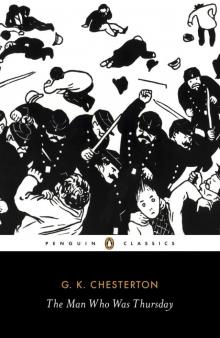 The Man Who Was Thursday: A Nightmare
The Man Who Was Thursday: A Nightmare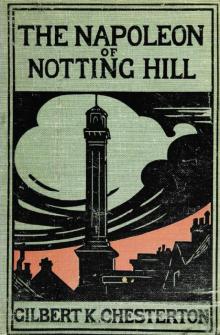 The Napoleon of Notting Hill
The Napoleon of Notting Hill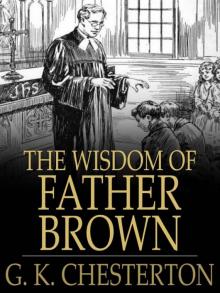 The Wisdom of Father Brown
The Wisdom of Father Brown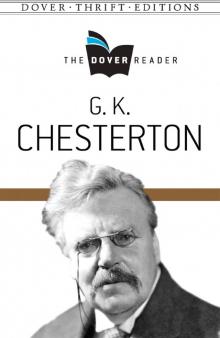 G K Chesterton- The Dover Reader
G K Chesterton- The Dover Reader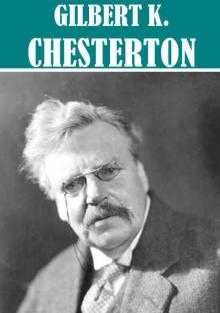 The Essential G. K. Chesterton
The Essential G. K. Chesterton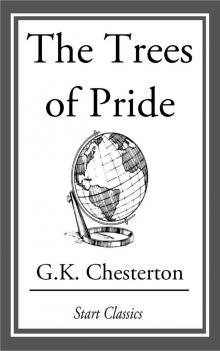 The Trees of Pride
The Trees of Pride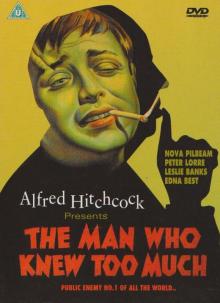 The Man Who Knew Too Much
The Man Who Knew Too Much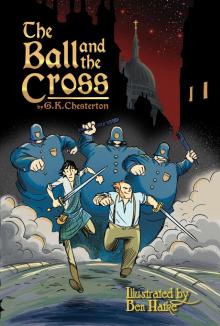 The Ball and the Cross
The Ball and the Cross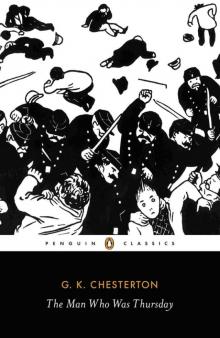 The Man Who Was Thursday (Penguin ed)
The Man Who Was Thursday (Penguin ed)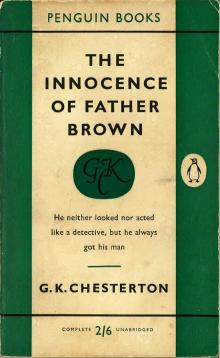 The Innocence of Father Brown
The Innocence of Father Brown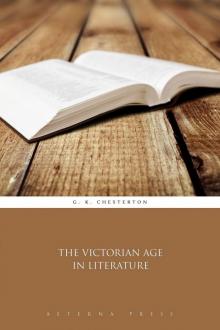 The Victorian Age in Literature
The Victorian Age in Literature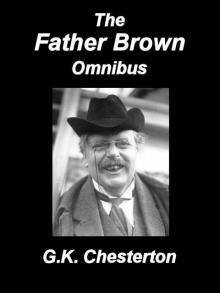 Father Brown Omnibus
Father Brown Omnibus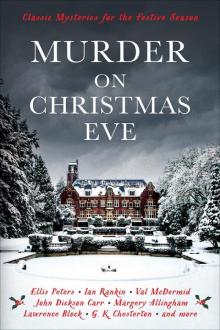 Murder On Christmas Eve
Murder On Christmas Eve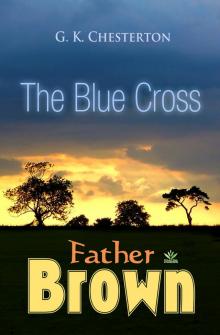 The Blue Cross
The Blue Cross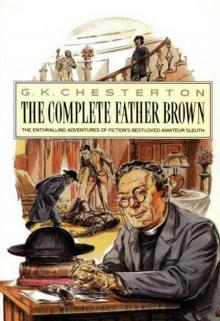 The Complete Father Brown Mysteries Collection
The Complete Father Brown Mysteries Collection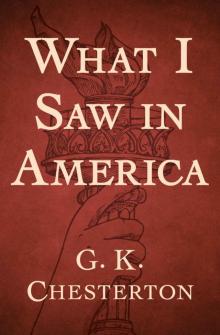 What I Saw in America
What I Saw in America